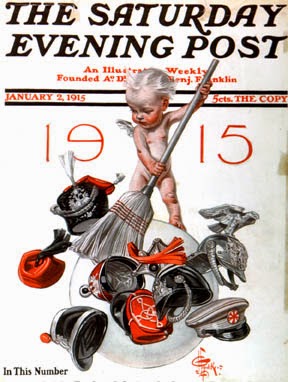Happy New Year -- Happy War! That seems to be the message of this French WWI post card, with "Good Year" (the literal translation of the greeting) spelled out over bullets or artillery shells, while interlocking guns and mistletoe frame the soldier and his sweetheart.
 The
war that was supposed to be over by Christmas of 1914 was settling in for a
long stay. For the French poilu (the nickname for French
infantry soldiers, just as the British were Tommies and the
Americans doughboys), the war would have terrible costs: it is
estimated that by the war’s end, over 70% of French active duty soldiers were
casualties of the war (over 1.3 million dead, over 4.25 million wounded).
The
war that was supposed to be over by Christmas of 1914 was settling in for a
long stay. For the French poilu (the nickname for French
infantry soldiers, just as the British were Tommies and the
Americans doughboys), the war would have terrible costs: it is
estimated that by the war’s end, over 70% of French active duty soldiers were
casualties of the war (over 1.3 million dead, over 4.25 million wounded). Veni, Sancte Spiritus! from A Song of Welcome to the New Year
Now
in the one thousand nine hundred and fourteenth year after Christ was born in
the stable;
Like
the Poor man’s face all at once against the windows of the worldly rich at
their wild dancing;
Like
the three words on the wall, when Belshazzar made his great feast;
Like
a moon of grief and terror, blinding each day’s sun with its savage splendour,
Over
every contemptible horizon of the Strumpet Europe,
The
blood-face of War!
And
before that terrible Star every star fell back, cast into the depths of night;
And
all works ceased, until the Great Work should be wrought;
And
men fixed their eyes upon fields of carnage, the place of celebration of a
great Mystery, a transcendental Sacrifice,
The
Mass whose celebrant is Fire, its unexampled music the gun, the Mass whose
victim they call the son of man.
I
sleep no more. There is a voice, in the
winter night, calling to me, a strange voice;
A
strong voice, and harsh, a voice accustomed to command: such a voice rings
agreeably in young men’s ears;
(And
it is no woman’s voice, nor that mermaid voice that haunts the Celtic sea);
A
voice that none can disobey: War, howling at the frontiers.
I
will obey. Soon I shall be with my brothers,
a soldier following soldiers.
Soon
I shall be among the slaughter…What signs are on my brow? New year, shall I see your end?
But it is of no account! Sooner, or later, when the hour to approach the Father sounds,
But it is of no account! Sooner, or later, when the hour to approach the Father sounds,
I
shall go with gladness. Jesus shall
comfort our mothers.
Be
blessed, new year, even should, among your three hundred and sixty-five days,
there be my last!....
New
year, year of war! Be blessed, even
should you
bring, wrapped in the folds of your cloak, next to springtime for
the world, death for me.
--Jean-Pierre Calloc'h (Yann Ber Kalloch), translated by Ian Higgins
The new year that this French soldier welcomes in 1915 is not heralded with merry song: instead, like a ravenous beast intent on devouring all before it, war “howls at the frontiers.” Here are no amorous meetings with sweethearts under the mistletoe, but rather men who go to meet their brothers “upon fields of carnage.”
The
mystical poet would live to see the beginning of the next new year, but would
not live to see the end of the war: he
was killed in action in April of 1917.
--Jean-Pierre Calloc'h (Yann Ber Kalloch), translated by Ian Higgins
 |
| Yann Ber Kalloch |
The new year that this French soldier welcomes in 1915 is not heralded with merry song: instead, like a ravenous beast intent on devouring all before it, war “howls at the frontiers.” Here are no amorous meetings with sweethearts under the mistletoe, but rather men who go to meet their brothers “upon fields of carnage.”
And
yet….this poem does welcomes the new year and invites the Spirit of God to
join in marking a new beginning. Calloc’h’s
poem recognizes the suffering that is to come and still names
the field of tragedy as “the place of celebration of a great Mystery, a
transcendental Sacrifice.” Even the valley of the shadow of death can be welcomed if he walks there with his Father God. What is
easily dismissed today as naïve superstition was for Calloc’h a bedrock of
belief that allowed him to say, “I shall go with gladness.”
 |
| Calloc'h's death certificate |














